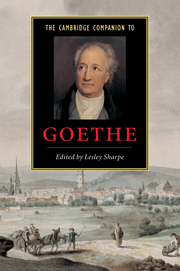Book contents
- Frontmatter
- Introduction
- 1 The world Goethe lived in
- 2 Goethe the writer and literary history
- 3 Goethe the poet
- 4 Goethe the dramatist
- 5 Faust
- 6 Weimar Classicism
- 7 Goethe and the Weimar theatre
- 8 Goethe’s prose fiction
- 9 Autobiographical writings
- 10 In defence of experience
- 11 Goethe and gender
- 12 Goethe and the visual arts
- 13 Goethe and the political world
- 14 Religion and philosophy
- 15 Reception in Germany and abroad
- A guide to further reading
- Index
13 - Goethe and the political world
Published online by Cambridge University Press: 28 May 2006
- Frontmatter
- Introduction
- 1 The world Goethe lived in
- 2 Goethe the writer and literary history
- 3 Goethe the poet
- 4 Goethe the dramatist
- 5 Faust
- 6 Weimar Classicism
- 7 Goethe and the Weimar theatre
- 8 Goethe’s prose fiction
- 9 Autobiographical writings
- 10 In defence of experience
- 11 Goethe and gender
- 12 Goethe and the visual arts
- 13 Goethe and the political world
- 14 Religion and philosophy
- 15 Reception in Germany and abroad
- A guide to further reading
- Index
Summary
By the time of Goethe's death in 1832, many of the characteristics of the modern age were evident: revolution, parliamentary democracy, political parties and human rights. However, the political world in which Goethe grew up and matured was essentially premodern; the eighteenth century saw only the first stirrings of the modern national state and its political institutions. The Treaty of Westphalia (1648) had cemented the status quo, in which hundreds of sovereign states sought increasing autonomy under the loose umbrella of the Holy Roman Empire – which, as the joke went, was neither holy nor Roman nor an empire, but rather a weak federation, approximately coextensive with German-speaking territories. Because the Empire was an impediment of sorts to the rise of the national state, it was seen as a political dinosaur by Prussophile nationalist historians in the nineteenth and twentieth centuries, and indeed by many thinkers in the eighteenth. However, more recent historians, critical of this nationalist heritage, have begun to valorize the Empire as the protector of rights, diversity and regionalism, as opposed to the faceless centralism and bureaucratization that characterized larger national states like France. There is certainly some truth to this view, which sees the Empire as a sort of model for European union today.
- Type
- Chapter
- Information
- The Cambridge Companion to Goethe , pp. 207 - 218Publisher: Cambridge University PressPrint publication year: 2002
- 2
- Cited by



